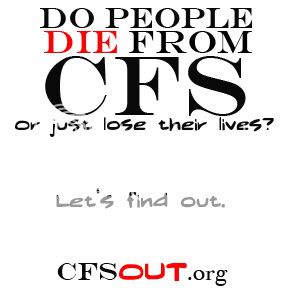put the BRAKES on any thought of a PR campaign at this time saying ME/CFS is contagious...Wait at least ONE YEAR please before even suggesting ME/CFS is related to XMRV in any PR. That is how long it will take for a small body of replication studies to take shape and a consensus to emerge.
I'm posting on this brilliant thread at last! There's been so much wonderful stuff going on here, and I missed the earlier part of the discussion, but I want you all to know how much I've been enjoying it. I think I agree with Kurt's conclusion, but for different reasons.
- I don't think it's going to take as long as a year for the consensus to emerge, and it'll take even less for us clued-up PWCs to be very confident about the findings. Several studies are due to report in about 6 months, no? Even one more independent confirmation, and a few more technical details from the WPI's unpublished research (they must have some massive stuff up their sleeves), will be good enough for me. Actually, it's already good enough for me. But I take the point that none of the details are clear yet; all it definitively proves is that CFS is real and physical.
- If you want to establish credibility as a new organisation in the public mind, then sticking your neck out and predicting a load of science a year before it hits the public consciousness seems to me a pretty good way of establishing your credibility with the public - once the news comes out officially and proves you right. Until it does come out officially, you'll be told you're jumping the gun. But once it does come out, a lot of people will remember where they heard it first; the next thing that group says, they will listen to carefully.
- Hoever: when the XMRV studies are confirmed, there will be no special need for the XMRV+ to campaign anyway: the science will do its thing for them. It's those left behind who will need a campaign - more so than ever. The ratio of shrinks to sick people will go through the roof!
So from the above, I think the campaign that makes sense to me over the next year is to aim to communicate the following:
- CFS is a serious and debilitating illness and destroys lives.
(noting comparison with MS, late-stage AIDS)
- CFS is a physical illness, not a psychological condition.
- CFS is still in the hands of psychologists (in the UK at least).
- CFS has not been taken seriously by science, govt or society.
- CFS research and care has been grossly under-funded.
- In particular, there has never been any publicly-funded medical research into CFS in US/UK. (perhaps somebody can clarify that into a broader and also more accurate statement, I have read there has been none since 1991 at least).
I think those would be the main messages from my point of view.
I'm torn on whether it's a good idea to try to publicise XMRV. I rather feel it's the best tool we've ever had for getting people to take us seriously, and I also feel that other CFS patients have the right to know about it - I'd suggest an estimate that maybe half the people in the UK with CFS have still not even heard of XMRV's existence. They deserve that hope, and the public needs time to start persuading themselves that they believed it was a virus all along.
But the campaigning should ideally focus on the needs of the group seemingly in the greater long-term danger: those with CFS who are XMRV-. So XMRV-related messages aren't the point for those people: general points like "CFS is a real physical illness" are more important for them. It's entirely possible that subgroups of CFS-related conditions in various parts of the world have a different, undiscovered retrovirus to explain their illness.
Final point: I'm labelling myself as an ideopath just at the moment for a reason: I think the most important themes we feel passionately and angrily about apply almost as much, if not just as much, to other people with chronic ideopathic conditions. IBS, MCS, GWS, and even a lot of people with completely different conditions of unknown cause, I suspect we all live together in the same waste-basket, and I suspect we all of us have XMRV. IBS, for example, is also considered to be a somewhat psychological condition, and a female problem. The labels CFS, IBS, MCS are almost meaningless. The fundamental shared injustice lies in having a condition that is poorly understood, not medically diagnosable, not treatable, or completely unknown. The way society deals with that scenario is the basic problem.
In the early days of my illness, when I knew nothing about the landscape and when doctors started saying "those symptoms are truly bizarre", "this fits no known pattern" and "this is medically impossible", I naively thought: "This is good news for me in the long run. I'm so medically unusual, such an exceptional case, that researchers will be falling over themselves to study me and find out some exciting new science that could unlock other mysteries. Sooner or later, I'm going to get to some specialist centre for unknown conditions, and then I'll get some really top-notch help". How ridiculous does all that sound?! Naive is not a strong enough word! It never occurred to me they would decide instead to ignore me and assume I was just making it all up or imagining it! But I still think the model I imagined is what ought to happen, so it's what I would personally want to campaign for. If people have been sick for a very long time, and there are lots of them, they should be studied intensively; that group should receive the most focus, not the least, for all kinds of obvious reasons. Apart from anything else, it's in the majority's interest to keep a close eye on those who are suffering strange new illnesses. Before a retrovirus spreads to 4% of the population...



